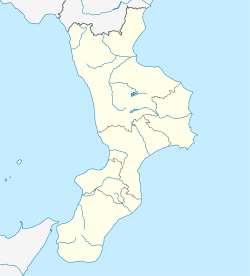| Marina di Gioiosa Ionica | |
|---|---|
| Comune | |
| Location of Marina di Gioiosa Ionica | |
  | |
| Coordinates: 38°18′N 16°20′E / 38.300°N 16.333°E / 38.300; 16.333 | |
| Country | Italy |
| Region | Calabria |
| Metropolitan city | Reggio Calabria (RC) |
| Frazioni | Junchi , Camocelli superiore , Camocelli inferiore, Cavalleria, Cerchietto, Drusù, Galea, Giardini, Lenza, Ligonia Carella, Ligonia Drusù, Pantalogna, Pantano, Porticato, Romanò, San Pietro, Spilinga, Torre Galea Carri Fragastò |
| Area | |
| • Total | 15.9 km (6.1 sq mi) |
| Population | |
| • Total | 6,603 |
| • Density | 420/km (1,100/sq mi) |
| Demonym | Gioiosani o Marinari |
| Time zone | UTC+1 (CET) |
| • Summer (DST) | UTC+2 (CEST) |

Marina di Gioiosa Ionica (Calabrian: 'A Marina) is a comune (municipality) in the Province of Reggio Calabria in the Italian region Calabria, located about 80 kilometres (50 mi) southwest of Catanzaro and about 120 kilometres (75 mi) northeast of Reggio Calabria. As of 30 September 2017, it had a population of 6,615 and an area of 15.9 square kilometres (6.1 sq mi).
The municipality of Marina di Gioiosa Ionica contains the frazioni (subdivisions, mainly villages and hamlets) Junchi, Camocelli superiore, Camocelli inferiore and many others.
Marina di Gioiosa Ionica borders the following municipalities: Gioiosa Ionica, Grotteria, Roccella Ionica.
History
The history of Marina di Gioiosa Ionica is closely intertwined with the history of Gioiosa Ionica.
The Roman theater of Marina di Gioiosa Jonica is located about 12km north of the archaeological park of ancient Locri and dates to the 3rd-4th century AD and most likely belonged to a villa or a statio from the imperial age.
The typical theatre structures such as the auditorium, the orchestra and the stage are clearly identifiable. The cavea, in particular, not built as in Greek times on a natural slope but on flat ground, is made up of a series of concentric walls which, in ancient times, must have been covered in stone slabs on which around 1200 spectators sat.
In the vicinity excavations discovered rooms belonging to thermal baths from the imperial age, and suggest the existence of further structures from the Roman era in the area.
Demographic evolution

References
- "Superficie di Comuni Province e Regioni italiane al 9 ottobre 2011". Italian National Institute of Statistics. Retrieved 16 March 2019.
- ^ All demographics and other statistics from the Italian statistical institute (Istat)
- LE VILLAE ROMANE DEL TERRITORIO https://www.locriantica.it/sito/villae_romane.htm#Palatium%20Tardoantico%20Di%20Quote%20San%20Francesco
This Calabrian location article is a stub. You can help Misplaced Pages by expanding it. |
